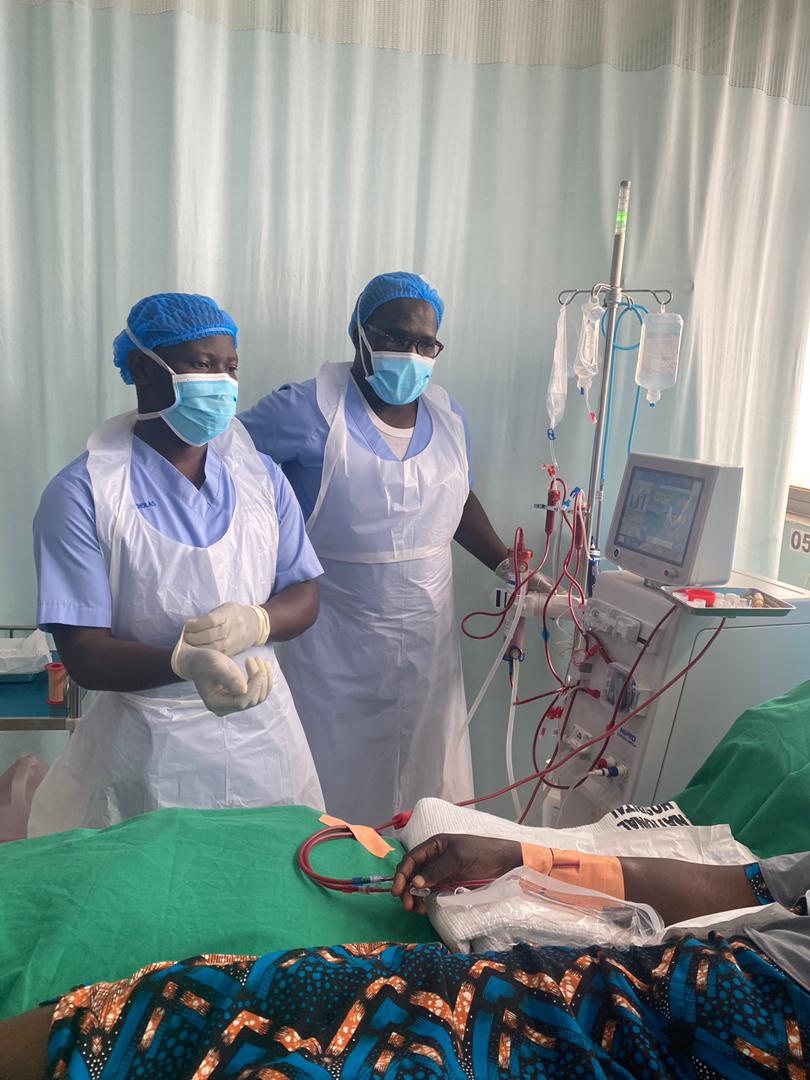Kawempe National Referral Hospital starts dialysis sessions
Dr Diana Atwine, the Permanent Secretary at the Ministry of Health, said the move aims to make life-saving kidney care more accessible to patients and praised the Kawempe team for their readiness and commitment.
The first sessions began earlier this week, with patients undergoing dialysis at the newly installed renal unit within the hospital premises. (Courtesy photos)
________________
Kawempe National Referral Hospital has officially begun offering dialysis sessions, marking a significant milestone in Uganda’s efforts to decentralise and expand kidney care services across the country.
The first sessions began earlier this week, with patients undergoing dialysis at the newly installed renal unit within the hospital premises.
The unit was set up with support from Kiruddu National Referral Hospital, which was mandated by the Ministry of Health to establish dialysis satellite sites across the country.
During the launch of Kiruddu Hospital's five-year plan for 2025–30, the executive director, Dr Charles Kabugo, noted that they are planning to set up dialysis unit centres in all regional hospitals to reduce the number of referrals from upcountry to the central hospitals.

This development adds to other centres that have already been established at Mbarara RRH, Mbale RRH, and Lira RRH.
“As part of the effort to set up dialysis satellite sites across the country. Kiruddu National Referral Hospital has so far set up Mbarara RRH, Mbale RRH, and Lira RRH, and we are glad to announce that Kawempe National Referral Hospital has been operationalised. With this we hope to reduce AKI referrals,” Kiruddu RRH posted on X.
This development is expected to ease pressure on Mulago and Kiruddu National Referral Hospitals, which have long been the main public facilities offering dialysis services to the growing number of patients battling kidney disease within the city centre.
Dr Diana Atwine, the Permanent Secretary at the Ministry of Health, said the move aims to make life-saving kidney care more accessible to patients and praised the Kawempe team for their readiness and commitment.
“As health ministry, we extend our heartfelt appreciation to the team at Kiruddu RRH for their invaluable technical support and knowledge exchange in the operationalisation of the dialysis unit at Kawempe RRH and other hospitals that are now part of the national satellite network for dialysis services,” she posted on her official X.
“We also commend the leadership of Kawempe National Referral Hospital for their continuous transformational leadership, even amidst challenges such as high patient volumes. Your unwavering commitment to service delivery continues to make a difference in the lives of many,” she added.
Dialysis is a life-saving procedure in which the blood of patients with kidney failure is cleaned. It is essential for survival, but it is also quite expensive and is often required three times a week for life.
The service has long been dominated by the private sector, where prices range from sh250,000 to sh350,000. Mulago RRH offers the same sessions at sh150,000 per session, amounting to sh450,000 per week even in a public facility.
Burden
Kidney disease in Uganda is on the rise and is among the top 10 causes of death, with a case fatality rate of 21% among patients admitted with chronic kidney disease (CKD).
According to Dr Robert Kalyesubula, 90% of people with this disease are unaware they have it.
“And 70% of the people who have the disease have no symptoms. So, if there is a key message here, it is that for the kidney disease, you have to look for it,” advises Dr Kalyesubula, one of the leading renal experts in Uganda. Besides not knowing whether they have the disease, those who do know are not on the right treatment.
“Over 52% come to the renal clinic with end-stage chronic kidney disease. And we have evidence that kidney disease kills. We looked at fifty thousand individuals. Over four years at Mulago. And kidney disease was the 5th cause of death among those who were dying from Mulago. So, we know, and we have evidence that kidney disease kills,” he said.
Damage leading to kidney disease can be caused by hypertension, obesity, and smoking, especially in developed economies.
However, in low- and middle-income countries like Uganda, infections from diseases such as malaria, sickle cell, HIV/AIDS, and childhood malnutrition can also lead to chronic kidney disease.